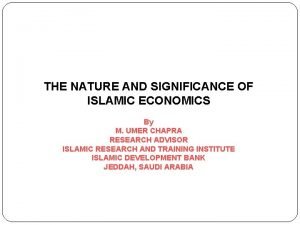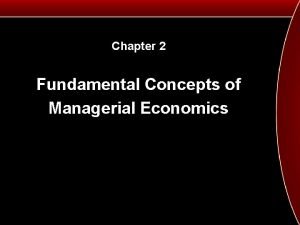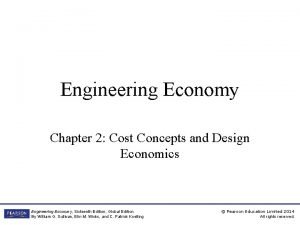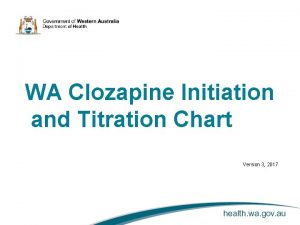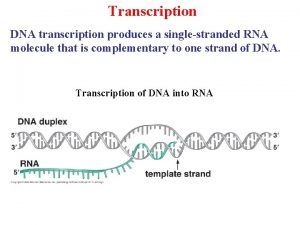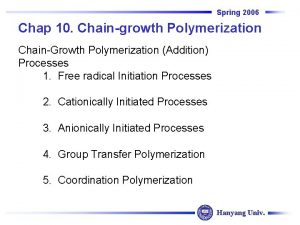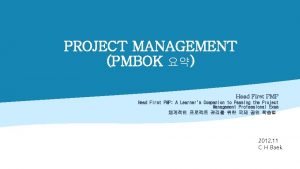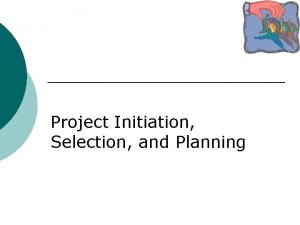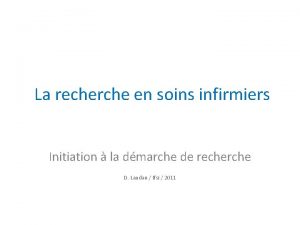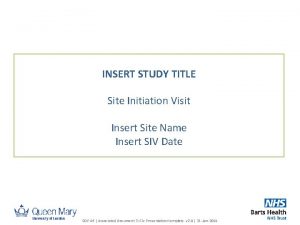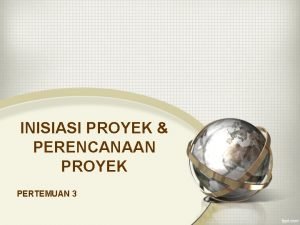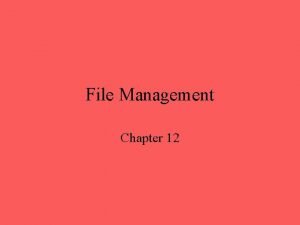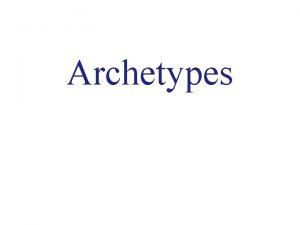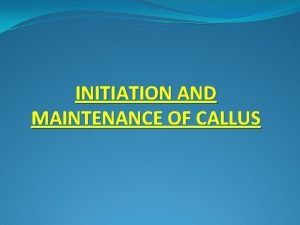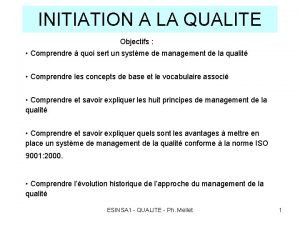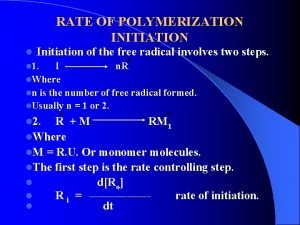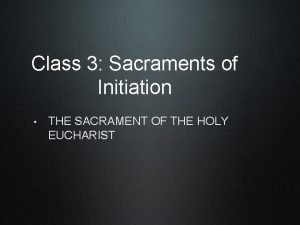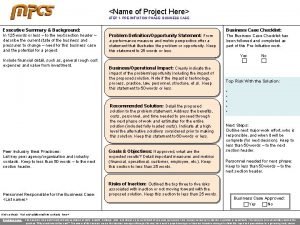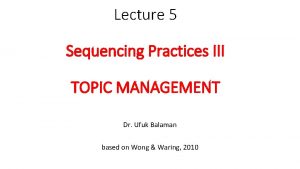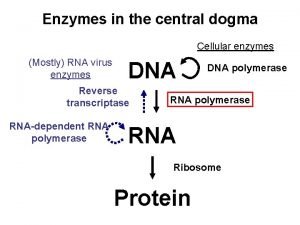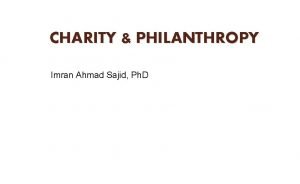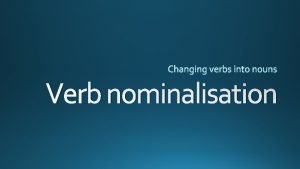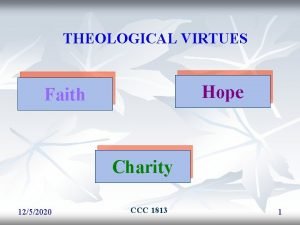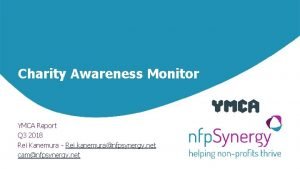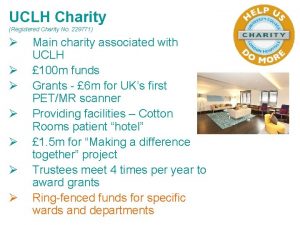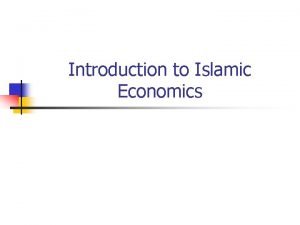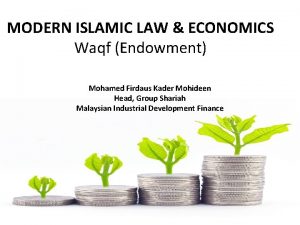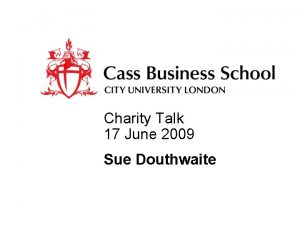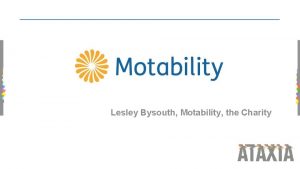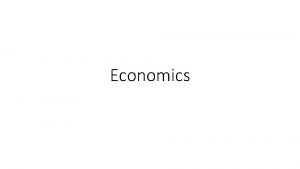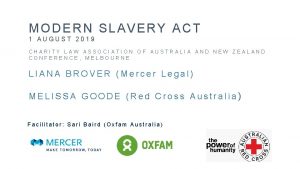MODERN ISLAMIC LAW ECONOMICS Islamic Charity Initiation Concepts






















































- Slides: 54

MODERN ISLAMIC LAW & ECONOMICS Islamic Charity Initiation “Concepts in Islamic Finance Related to Charity” Haji Razli Ramli Principal Adviser 1

BEGIN WITH THE END IN MIND… At the end of this session, the participants are expected to understand the following: 1. Explain and apply the various concepts in Islamic Finance including contracts related to charitable initiation; 2. Explain and apply the prohibitions under Islamic finance; 3. Understand salient features of Islamic charitable contracts; 4. Applications of Islamic commercial contract (microfinancing) in the modern Islamic finance. 2

Section 1 Introduction to Islamic Finance & Fiqh al Muamalat 3

INTRO TO ISLAMIC FINANCE v When we speak of Islamic Finance or Islamic economic principles, it is generally assumed that these principles are emphasized by Muslim scholars only to satisfy the religious requirement of Muslims, or that they are meant only for Muslims to the exclusion of all others. This is an incorrect assumption!!! v Although Islam is basically represented by a set of beliefs, the benefits of its social, political and economic principles are not restricted to Muslims; they are meant for the common good of humanity at large. 4

SHARIAH : AN INTRODUCTION v Shariah generally means Islamic law v 3 basic branches of Shariah beliefs, the moral / ethic and fiqh (code of laws / jurisprudence) v Shariah Ø The rules ordained by Allah s. w. t for His servants through His Messenger Ø Revealed v Fiqh Ø Islamic Jurisprudence Ø the knowledge of the practical Shariah rules which is deduced from their respective particular evidences. Ø Ijtihad and power of reasoning is stressed Ø Mazhab (school of thought) – Hanafi, Maliki, Shafie and Hanbali v Public – Shariah and fiqh are used interchangeably 5

COMPONENTS OF SHARIAH AQIDAH (Faith & Belief) FIQH (Practices & Activities) AKHLAQ (Moralities & Ethics) Concerning faith and beliefs in ALLAH and His will Concerning practical actions in manifesting his faith and beliefs Concerning behaviour, attitude and work ethics in taking practical actions IBADAT MUAMALAT (Man-to-God Worship) (Man-to-Man Activities) Concerning practicalities of his worship of ALLAH Concerning practicalities of his daily life in various forms of man-to-man activities POLITICAL ACTIVITIES ECONOMIC ACTIVITIES SOCIAL ACTIVITIES 6

COMPONENTS OF SHARIAH (cont’d) ECONOMIC ACTIVITIES COMMERCIAL CHARITABLE (NON PROFIT) -TRADE - LOAN (QARD) - BANKING - ZAKAT -WAQAF - SADAQAH -FINANCE - INVESTMENT 7

SOURCES OF SHARIAH- Primary 8

SOURCES OF SHARIAH- Secondary 9

SHARIAH COUNCIL’S VIEW v View of Shariah Committee is an ijtihad and considered as source in Islamic jurisprudence. v International level – Islamic Fiqh Academy of OIC and Accounting and Auditing Organisation for Islamic Financial Institutions (AAOIFI) Shariah Council. v National level – Shariah Advisory Council (SAC) at BNM and SC v Bank level – Shariah Board/Committee of a Bank 10

SHARIAH COMPLIANCE IN FINANCIAL ACTIVITIES v Demarcation between devotional acts (ibadat) and commercial matters (mua’malat) v Initial Legal Ruling in Commercial Contract is permissibility v Open a very wide door for innovations v Every contract is considered lawful and acceptable if no principles of Shari’ah has been contravened v Islamic commercial contracts are free from: i. Riba’ (interest/usury) ii. Gharar (excessive ambiguities); iii. Maysir (gambling); iv. Transactions involving prohibited assets/commodities 11

Section 2 Prohibitions in Islamic Commercial Law 12

WHAT ARE THE ELEMENTS NOT APPROVED UNDER ISLAM? Riba (interest/ usury) GHISH Forbidden concealment of information. Transparency is vital Producing and trading in “Haram” goods/activities Gharar (Excessive uncertainty) Ihtikar (Hoarding to bidup prices) Maysir (Gains from game of chance i. e. gambling) 13

WHAT ARE THE ELEMENTS NOT APPROVED UNDER ISLAM? Riba Literally means “to increase ; to grow up ; to exceed” and generally translated as “usury” or “interest”. Riba applies to unlawful gain derived from the quantitative inequality of the counter values in any transaction. It is specifically forbidden in the Quran in reference to interest bearing loans. Two types of riba : i. Riba al-Qurudh – is created from loans i. e the borrower pays the loan plus interest ii. Riba al-Buyu` - is created from trade. The Prophet (pbuh) has classified type of good which being considered as ribawi goods. 14

RIBA Riba Al-Qard (Riba of Debt) Additional amount repaid in debt transactions. a) The debtor borrowed a certain sum for a certain period according to the agreed terms, the debtor must pay back more than the capital sum or loan, or b) A trader sold his product for a specific deferred payment period. If the buyer failed to pay within that period, the period was extended by increasing the selling price or debt amount. 15

RIBA Riba Al-Bai’ (Riba of Trading) Occurs in the trading of “ribawi” products as stated by the Prophet s. a. w. in his hadith: “Exchange gold for gold, silver for silver, wheat for wheat, barley for barley, dates for dates, salt for salt, like for like, equal for equal, and hand to hand. If what you have exchanged differs in type, you can trade as you wish, provided that the exchange is hand to hand. ” (Narrated by Muslim) 16

RIBAWI MATERIALS Ribawi materials are divided into two bases and under each basis are the different kinds as follows: BASIS (MEDIA OF EXCHANGE) BASIS (FOODSTUFFS) • Gold • Grains – rice, wheat, corn • Silver • Meats – beef, mutton, chicken • RM • Vegetables – tomatoes, bean • USD • Fruits – apples, oranges • Salts – salt, sugar, condiments 17

RULES OF EXCHANGE OF RIBAWI MATERIALS EXCHANGES RULES Ribawi materials of the same kind of the same basis. • Ribawi materials of different kinds of different bases. • Materials must be of the same weight, measurement or number of units. • Payment must be on cash terms Difference in weights, measurements or number of units allowed, • Payment must still be on cash terms. No rules are imposed. (Difference in weights, measurements or number of units allowed) 18

2) GHARAR (EXCESSIVE UNCERTAINTY/ AMBIGUITY) v Literally : ambiguity/uncertainty v It refers to the sale of probable item whose existence or characteristics are not certain. v The examples of Gharar as follows: 1) Selling goods that the seller is unable to deliver 2) Selling goods without proper description, such as shop owner selling clothes with unspecified sizes 3) Selling goods without specifying the price 4) Selling goods on the basis of false description 5) Selling goods without allowing the buyer properly examine the goods 19

GHARAR Types of Gharar 1) Gharar Fahish (Major Uncertainty) Ø uncertainty which is so great that it becomes unacceptable e. g. sale of non existence object, sale of object that unable to be delivered, sale of object not according to agreed specifications 2) Gharar Yasir (Minor Uncertainty) Ø uncertainty which is considered a normal phenomenon in the market if it is not excessive where the effect on the economy and society is considered minimal. This is accepted by Shariah as it would be practically impossible to eradicate it from the market. 20

3) MAYSIR (GAMBLING) v Any activities which involve betting whereby the winner will take the bets and the loser will loss his bet. v The examples of gambling activities are play card (daun terup), mahjong, lottery, lotto, etc. v In the case where the participants may try their luck but not losing anything if not selected as winners, it is allowable. For instance, Petronas Super Car Craze Contest, where the winners get the car and others still enjoy their car fuel. 21

NEGATIVE LIST: GOODS AND BUSINESS ACTIVITIES Apart from Riba, Gharar and Maysir, Islam prohibits us from producing, financing, selling, purchasing and dealt with the following goods and business activities: 1. Entertainment (Disco/ night club/ casino/ Prostitution service, etc); 2. Pornography such as video tape, magazine, book; 3. Weapons (for destructive purposes); 4. Alcohol; 5. Drug; 6. Pork-related production and non-halal foods; 7. Tobacco; 8. Stock broking or share trading in Shariah non-compliant securities; 9. Conventional financial services (banking, insurance, etc); and 10. Other activities deemed non permissible according to Shariah principles 22

Section 3 Comparison between Islamic Finance and Conventional Banking 23

ISLAMIC VS CONVENTIONAL BANKING 24

ISLAMIC VS CONVENTIONAL BANKING 25

Section 4 “Most Common Shariah Principles and Its Application in Islamic Banking” 26

CLASSIFICATIONS OF ISLAMIC COMMERCIAL CONTRACTS TYPES OF CONTRACTS SALE-BASED Murabahah (cost-plus)* Istisna (construction)* Salam (deferred delivery) Tawarruq (Monetization)* Urbun (earnest money) Inah (purchase and sale back)* v Sarf (currency exchange) * v v v PARTNERSHIP-BASED LEASE-BASED v Mudarabah (profit sharing)* v Musharakah (profit, loss sharing)* v Ijarah (leasing) * v Ijarah Thumma Bay (leasing followed by sale/HP) * FEE-BASED v Wadiah (safekeeping) v Wakalah (agency)* * Widely applied contracts in commercial transactions OTHERS v v v Qard (interest free loan) Kafalah (guarantee) Hibah (gift) Ibra ‘(rebate) Muqasah (set-off) Rahnu (pawn broking) 27

COMMON SHARIAH CONTRACTS There are few common Shariah contracts applied to various Islamic capital market instruments which are as follows: 1. Mudarabah (profit sharing); 2. Musharakah (profit-loss sharing) + Musharakah Mutanaqisah (diminishing partnership); 3. Murabahah (cost-plus/markup); 4. Ijarah (Leasing); 5. Istisna’ (Construction contract) + Istisna’ Ijarah; 6. Tawarruq/ Commodity Murabahah (Monetization); 7. Wakalah (Agency) 28

1) MUDARABAH v mudarabah refers to a contract made by two (2) parties to finance a business venture. v The parties are a Rabbul mal (investor) who solely provide the capital and a Mudharib (entrepreneur) who solely manages the project. If the venture is profitable, the profit will be distributed based on a pre-agreed ratio. v In the event of a business loss, the loss shall be borne solely by the provider of the capital. However, if the losses are caused by the Mudharib’s negligence or misconduct, the Mudharib shall be liable to bear all the losses. v The Mudharib cannot guarantee the capital nor the return from the venture A Generic mudarabah Transaction is Illustrated Below: Rabb al Mal (capital provider) Profits to be shared while losses are solely borne by the Rabb al mall Mudharib (entrepreneur) Management Skills Capital mudarabah Venture 29

TENETS OF MUDARABAH mudarabah 1. Contracting parties (rabb al-mal / mudharib) 2. Subject matter (capital, profit & loss) 3. Offer & Acceptance (Ijab wa qabul) 30

2) MUSHARAKAH v Musharakah refers to a partnership arrangement between two parties or more to finance a business venture whereby both parties contribute capital either in the form of cash or in-kind for the purpose of financing the business venture. v Both parties may jointly manage the business or one partner manages the business with another partner’s consent. v Any profit derived from the business venture will be distributed on a preagreed profit sharing ratio and the loss will be shared on the basis of the capital participation. v The partner cannot guarantee the capital not the return to another partner from the venture. A Generic Musharakah Transaction Is Illustrated Below: 2. Bank appoints client as the Musharik to manage the Musharakah Venture CLIENT BANK Profit / loss 1. Bank and Client contributes capital to the Musharakah Venture MUSHARAKAH VENTURE 3. Profit and losses are shared based on the capital contributed by the partners. 31

TENETS OF MUSHARAKAH MUSYARAKAH 1. Contracting parties i. e partners 2. Subject matter i. e capital contribution, work, profit and loss sharing ratio 3. Offer & Acceptance (Ijab wa qabul) 32

MUSHARAKAH MUTANAQISAH (DIMINISHING PARTNERSHIP) v Musharakah Mutanaqisah or musharakah muntahiyah bit tamlik means diminishing musharakah v It is a type of a partnership where a partner purchases the units of the share of the other partner gradually, until that particular partner finally hold the full ownership of the asset/ business; v This concept is a hybrid concept whereby it consists of three contracts which are musharakah (partnership), ijarah (leasing) and wa’ad/promise to purchase (purchase undertaking). v This hybrid concept is widely applied for home/project financing. 33

MUSHARAKAH MUTANAQISAH (DIMINISHING PARTNERSHIP) 10% 1. Musharakah Agreement Partnership Contract to co own asset 90% Asset §(Partnership Purchases Asset) Customer 4. Notice of Fulfillment Transfer of full ownership to Customer upon fulfillment of Musharakah terms Bank 3. Ijarah Agreement Customer pay rental for using Bank’s stake in the asset. 2. Purchase Undertaking Customer undertakes to make monthly Musharakah Unit purchases to gradually reduce Bank’s stake and increase his/her % of the asset ownership 34

mudarabah VS MUSHARAKAH mudarabah 1. Only one party contributes capital and only one party manages the business; 2. Capital must be in form of CASH; 3. Loss shall be borne by the Rabbul Mal Musharakah 1. Both parties contribute capital and both parties can manage the business; 2. Capital can be CASH INKIND; 3. Loss shall be borne by the partners based on capital ratio 35

3) MURABAHAH v Murabahah is a type of contract, which is considered as a form of sale, where the seller expressly mentions the costs of the sold commodity he has incurred, and sells it to another person by adding some profit or mark-up thereon. v The only feature distinguishing it from other kind of sale is that the seller expressly discloses the cost of the asset sold and how much profit he is going to charge in addition to the cost v The Bank purchases the asset from the supplier / vendor and sells it to the customer at a mark-up price. v Being a sale, and not a loan, the Murabahah should fulfill all the necessary conditions for a valid sale. A Generic Murabahah Transaction is Illustrated Below: SUPPLIER 1. Bank purchases the goods. Customer will act as Bank’s agent CUSTOMER 2. Bank makes payment upon receipt of trade document 3. Bank sells the goods via execution of Murabahah Contract Note BANK CUSTOMER 4. Customer shall make payment as per manner agreed 36

TENETS OF MURABAHAH 1. Contracting parties (seller and buyer) 2. Subject matter (ma`qud alaih)Underlying asset 3. Offer & Acceptance (Ijab wa qabul) 37

4) IJARAH v Ijarah refers to manfaah (usufruct/benefit) type of contract whereby a lessor (owner) leases out an asset or an equipment to a client at an agreed rental fee and predetermined lease period upon the aqad’ (contract). v The ownership of the lease equipment remains in the hands of the lessor. v Ijarah can be divided into two types, i. e. , finance lease and operating lease. v For finance lease, it is known as Ijarah Muntahiyah bittamlik (leasing which ends with transfer of ownership). v In normal Ijarah, the leased asset must be in existence upon execution of leasing agreement. However, the specified under construction asset/property can be used as a leased asset under principle of Ijarah Mawsufah fi Zimmah (forward lease). A Generic Ijarah Transaction is Illustrated Below: 3. Payment to Vendor VENDOR 1. Customer purchases the asset 2. Customer enters into a purchase agreement with the Bank. BANK CUSTOMER 4. Execute the Ijarah Agreement and customers pays installment (rental) to the Bank. 5. Bank sells the asset at the end of tenure at a nominal amount or any agreed price. 38

IJARAH MUNTAHIYAH BI TAMLIK ( ﺍﻹﺟﺎﺭﺓ ﺍﻟﻤﻨﺘﻬﻴﺔ ﺑﺎﻟﺘﻤﻠﻴﻚ ) v It is a leasing contract which ends with ownership. It is similar to practice of hire purchase in conventional v It refers to an Ijarah (leasing/renting) contract to be followed by contract of ownership such as bai` (purchase) contract or hibah (gift). v Under the first contract, the lessee leases the asset from the owner (lessor) at an agreed rental over a specified period. Upon expiry of the leasing period, the ownership of the asset will be transferred to the lessee through 2 nd contract such as sale contract (bai`) at an agreed price or hibah (gift). v Completed asset. 39

IJARAH MAUSUFAH FI ZIMMAH ( ﺍﻹﺟﺎﺭﺓ ﺍﻟﻤﻮﺻﻮﻓﺔ ﻓﻲ ﺍﻟﺬﻣﺔ ) v It is an ijarah contract which is executed for an asset undertaken by the lessor to be delivered to the lessee according to accurate specifications, even if the asset is not owned by the lessor. v During the period that the leased asset/property is under construction, the lessor may ask the lessee to pay a certain portion of pre agreed lease rental as a forward lease. The forward lease rental payment will be considered as a debt to the lessor until the delivery of the leased asset to the lessee. v Ijarah Mausufah Fi Zimmah can be in a form of operating lease or financial lease. v Asset under construction or yet to be delivered. v If the lessor fails to deliver the asset, the lessor is obliged to repay the advance rental paid by the lessee. 40

TENETS OF IJARAH There are three tenets of Ijarah which are as follows: 1. Contracting parties (lessor and lessee) 2. Subject matter of lease i. e. , lease payment (rental) and leased asset 3. Ijab and qabul (offer and acceptance) 41

5) ISTISNA' v Istisna' is an order or request to manufacture or construct something, whereby the requestor invited, induced or caused another to make or manufacture goods for him. v Technically, it is a contract to purchase for a definite price something that may be manufactured or later according to an agreed specifications between the parties. v In other words, it is a contract of sale of a specified item to be manufactured or constructed with an obligations on the part of the manufacturer or contractor to deliver the item to the customer on completion. A generic Istisna' transaction is illustrated below: 1) Single Istisna’ 1. Customer places an order to construct the Istisna’ asset and pays progress billings CUSTOMER BANK 2. Bank delivers Istisna’ asset upon full settlement of progress billings 2) Parallel Istisna’ CONTRACTOR (other than customer) 2. Bank agrees and request contractor to construct the Istisna’ asset 3. Upon completion, contractor delivers Istisna’ asset to the Bank 4. Bank delivers Istisna’ asset BANK CUSTOMER 1. Customer places an order to construct the Istisna’ asset and pays progress billings 42

TENETS OF ISTISNA’ There are three tenets of Istisna’ which are as follows: 1. Contracting parties (orderer / mustasni’ and contractor / soni’) 2. Subject matter of Istisna’ i. e. the construction project, Istisna price and completion date. 3. Ijab and qabul (offer and acceptance) 43

ISTISNA` FOLLOWED BY IJARAH / IJARAH MAUSUFAH FI ZIMMAH Steps : 1. Customer enters to a contract with the Bank to construct a project / asst (eg : home) and to lease upon completed 2. Simultaneously, the Bank will appoint a contractor to construct based on parallel istisna. It is allowed to appoint the customer as an agent to deal with the contractor. 3. Upon delivery of the project/ home to the Bank, simultaneously the Bank will lease the project / asset to the customer based on Ijarah principle. 4. The ijarah might kick-off during construction of the leased asset using ‘ijarah mausufah fi zimmah’ (forward lease) principal. 44

ISTISNA` FOLLOWED BY IJARAH / IJARAH MAUSUFAH FI ZIMMAH 4 3 1 Bank Customer 2 5 6 Process Flow : 1. Customer applies for a financing to construct a vessel. 2. Bank will enter into Istisna Purchase Agreement to appoint Customer as its contractor to construct and deliver the vessel to the Bank. 3. Bank and Customer subsequently enter into a Forward Lease (Ijarah mawsufah fi zimmah) Agreement which states Customer to pay advance rental during the construction period and full rental upon completion of the property. 4. Customer unilaterally signs the Purchase Undertaking. 5. Bank makes progressive payments to Customer. 6. Upon completion of the lease period or earlier, if there are no sums whatsoever due to the Bank, the Customer will purchase the Asset at a nominal value or any agreed price. 45

6) TAWARRUQ/COMMODITY MURABAHAH v. Literally, tawarruq is originated from word of wariq which means dirham (money) which is made from silver. v Also known as “commodity murabahah”. v Tawarruq has been approved by the scholars as a solution for cash financing facility. v A customer with a genuine need buys something on credit from the financier / depositor / investor on a deferred payment basis based on murabahah or musawamah and then resells it for cash to a third party. In this way, the customer can obtain cash without taking an interest-based loan. 46

TAWARRUQ/COMMODITY MURABAHAH (FINANCING STRUCTURE) 1 - ABC request for financing via purchase request of commodity to Maybank IB with ABC’s undertaking to purchase the commodity Bank A 2 – Bank A purchases commodity on a spot basis from Commodity Broker 1. ABC Bank A as Agent 4 - Bank A sells the commodity to customer on a deferred payment basis 3 -Commodity (Cost + profit). Commodity Broker 1 5 – As owner of the commodity, ABC appoints Bank A as agent to sell the commodity to Commodity Broker 2 on a spot basis 6 – Spot Price RM equivalent to financing amount release to ABC Commodity Commodi Broker 2 ty 47

TENETS OF TAWARRUQ/COMMODITY MURABAHAH The three tenets of Murabahah are as follows: 1. Contracting parties i. e. seller and buyer 2. Subject matter of the sale i. e. specified commodities such as CPO, metal, etc. 3. Ijab & Qabul, i. e. offer and acceptance 48

AAOIFI STANDARD ON TAWARRUQ/CM 1. The requirement of the contract for purchasing commodity must be well observed – Genuine Sale & Purchase. 2. The commodity must be purchased and subsequently sell to different party- no inah (back-to-back) element. 3. The purchase of commodity on spot basis and the sale the commodity on deferred basis must be separated. 4. The Customer cannot appoint the Bank or its proxy to sell the commodity on his/her behalf. However if there is any genuine hurdle, the Bank may act as the Customer’s agent. 49

WAKALAH (AGENCY) v Wakalah is a contract whereby somebody (principal) hires someone else to act on his behalf i. e. as his agent for a specific task. v The agent is entitled to receive a predetermined fee irrespective of whether he is able to accomplish the assigned task to the satisfaction of the principal or not as long as he acts in a trustworthy manner. However, the agent would be liable to penalties only if it can be proved that he violated the terms of the trust or acted dishonestly. v In the case of a financial wakalah contract, clients give funds to the bank/company that serves as their investment manager. The bank/company charges a predetermined fee for its managerial services. Entire profit or loss is passed back to the fund providers after deducting such a fee. 1. Customer appoints the Bank as its investment agent Customer (principal) 2. Customer pay the Bank agency fee/ commission. Bank (agent) 3. The Bank distribute the return & capital from the investment. 50

TENETS OF WAKALAH The three tenets of Wakalah which are as follows: 1. Contracting parties i. e. Muwakkil (principal) and Wakil (agent); 2. Subject matter of wakalah: Specific responsibility of Wakil and wakalah fee; and 3. Ijab & Qabul, i. e. , Offer and Acceptance 51

APPLICATION OF THE CONTRACTS Types of Contract Use of Contract Underlying Asset Can Financiers take collaterals? Murabahah Working Capital for Assets acquisitions Tangible asset Yes Ijarah Operating/Financial Leased asset Yes Istisna’ Construction/Project Financing Construction project Yes mudarabah Deposit/Working capital for business Customer’s business/project Yes (to protect capital in case of negligence) Musharakah Working capital for business and asset acquisition Customer’s business/project Yes (to protect capital in case of negligence) Tawarruq/ CM Deposit/Working Capital/ Hedging instruments Commodity. Normally CPO Yes Wakalah Working capital for business/ project Customer’s business/project Yes (to protect capital in case of negligence) 52

Q&A 53

THANK YOU & WASSALAM IBFIM 3 rd Floor, Dataran Kewangan Darul Takaful, Jalan Sultan Sulaiman 50000 Kuala Lumpur. (Tel) +603 -2031 1010 (Fax) +603 -2031 9191 (E-mail) razli@ibfim. com / info@ibfim. com 54
 Nature of islamic economics
Nature of islamic economics Discounting concept in managerial economics
Discounting concept in managerial economics Engineering economy 16th edition chapter 2 solutions
Engineering economy 16th edition chapter 2 solutions Equi marginal principle in managerial economics
Equi marginal principle in managerial economics Newton's first law and second law and third law
Newton's first law and second law and third law Si unit of newton's first law
Si unit of newton's first law V=k/p
V=k/p Boyle's law charles law avogadro's law
Boyle's law charles law avogadro's law School of business and economics maastricht
School of business and economics maastricht Non mathematical economics
Non mathematical economics Concept of child health nursing
Concept of child health nursing Clozapine initiation chart
Clozapine initiation chart Rho independent termination
Rho independent termination When does odysseus cross the threshold
When does odysseus cross the threshold Initiation radical reaction
Initiation radical reaction Project initiation document
Project initiation document Importance of project initiation
Importance of project initiation Initiation à la recherche en soins infirmiers
Initiation à la recherche en soins infirmiers Site initiation visit ppt
Site initiation visit ppt Confluence project plan
Confluence project plan Phases of home visiting
Phases of home visiting Is responsible for all file i/o initiation and termination
Is responsible for all file i/o initiation and termination Divergent book setting
Divergent book setting Platonic ideal archetype
Platonic ideal archetype Sop sign off sheet
Sop sign off sheet Sensibilisation et initiation à la cybersécurité
Sensibilisation et initiation à la cybersécurité Mark knapp's stages of coming apart
Mark knapp's stages of coming apart Initiation and maintenance of callus culture
Initiation and maintenance of callus culture A quoi sert la qualité
A quoi sert la qualité L'initiation
L'initiation Initiation à la démonstration 5ème
Initiation à la démonstration 5ème What are the 3 sacraments of initiation
What are the 3 sacraments of initiation Separation initiation return
Separation initiation return Separation initiation return
Separation initiation return Peace amplifier
Peace amplifier Pre initiation phase project management
Pre initiation phase project management Topic initiation
Topic initiation Initiation promotion progression
Initiation promotion progression Initiation complex
Initiation complex Central dogma
Central dogma Project selection process
Project selection process Indiana gaming commission charity gaming division
Indiana gaming commission charity gaming division Makati medical center charity program
Makati medical center charity program Tujuan acara
Tujuan acara Charity retail association
Charity retail association At 7
At 7 Verb of charity
Verb of charity Ccc charity
Ccc charity Roman charity
Roman charity Charity awareness monitor
Charity awareness monitor Asha daan- missionaries of charity
Asha daan- missionaries of charity Opal charity
Opal charity Interesting facts about st vincent de paul
Interesting facts about st vincent de paul Charity slobod
Charity slobod Shaded judgement stone
Shaded judgement stone
